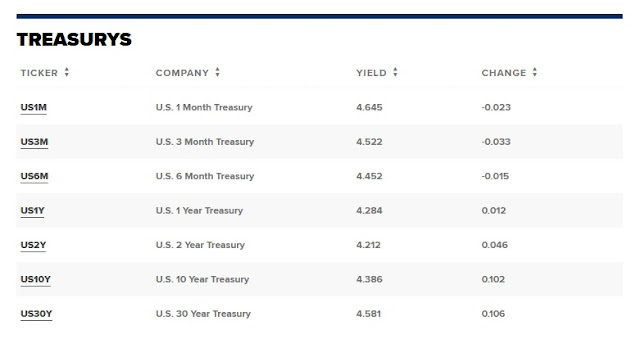Why Is The Bond Market Ignoring Weak US Jobs Report?
Stocks rallied Friday to kick off November as Amazon led big technology stocks into the green and traders looked past a disappointing jobs report.
The Dow Jones Industrial Average gained 288.73 points, or 0.69%, ending at 42,052.19. The S&P 500 advanced 0.41% to close at 5,728.80, and the Nasdaq Composite rose 0.8% to 18,239.92.
Amazon rallied 6.2% as strength in the cloud and advertising businesses propelled the e-commerce giant above Wall Street’s earnings expectations. Intel popped 7.8% after exceeding analysts’ forecasts for revenue and offering strong guidance. The two stocks helped lift investor sentiment following some notable earnings disappointments this week.
Megacap tech stocks are still “the tail wagging the dog,” said Rob Williams, chief investment strategist at Sage Advisory. “You’re seeing some broadening, but it’s still such a massive component right now.”
Meanwhile, the jobs report released Friday showed the U.S. economy added just 12,000 jobs in October, far below the Dow Jones estimate of 100,000. This marked the weakest level of jobs creation since December 2020. The unemployment rate held at 4.1%, in line with estimates. However, traders were not reacting too much to the jobs figures, believing the dismal data was affected by hurricanes and a Boeing strike.
“Friday’s jobs report showed that the labor market decelerated quite significantly in October compared to September,” said Clark Bellin, president and chief investment officer at Bellwether Wealth. “But this was a noisy number largely due to hurricanes and labor strikes, so it’s unlikely that this weakness is going to cause the Federal Reserve to pivot away from its expected 25 basis point rate cut at the November meeting.”
In addition to the U.S. presidential election on Nov. 5., which has led to elevated volatility, investors are also looking toward the Fed’s two-day policy meeting on Nov. 6-7.
The major averages are wrapping up a choppy week. The S&P 500 lost 1.4% in the period, while the Nasdaq slid 1.5%. Postearnings slumps in Microsoft and Meta Platforms weighed on the indexes. The 30-stock Dow inched down 0.2% week to date.
The strong start to November comes after a difficult October for the market. The 30-stock Dow pulled back 1.3% in October. The broad market index fell 1% in that time, while the Nasdaq dropped 0.5%.
Hakyung Kim, Jesse Pound and Sophie Kiderlin also report 10-year Treasury yield rises above 4.3% as traders ignore noisy jobs report:
The yield on the 10-year Treasury rose as traders downplayed October jobs data showing meager job growth that was hurt by hurricanes and striking workers, and was far below what Wall Street was expecting.
The 10-year Treasury yield jumped nearly 10 basis points at 4.382%. The 2-year Treasury yield was higher by 5 basis points at 4.216%. The uptick in yields marks a continuation of their recent rebound from October.
Yields and prices move in opposite directions. One basis point equals 0.01%.The October nonfarm payrolls report showed a gain of just 12,000 jobs for the month. Economists surveyed by Dow Jones were expecting growth of 100,000 jobs.
The Bureau of Labor Statistics cautioned that the report was influenced by hurricanes and the strike at Boeing. Those complications may have dampened the reaction to the miss among traders.
The unemployment rate held steady at 4.1%.
The murky jobs report could play a role in next week’s meeting of Federal Reserve officials, where the central bank will decide how to follow up September’s 50 basis point rate cut.
“While the Fed will likely attribute some of the weakness in today’s data to one-off factors, the softness in today’s data argues for the Fed to continue its easing cycle at next week[’s] meeting. Stormy numbers but sky clearing for November 25 bp cut,” Lindsay Rosner, head of multi sector fixed income investing at Goldman Sachs Asset Management, said in a statement.
Investors this week have weighed a series of key economic reports published throughout the week, including Thursday’s personal consumption expenditures price index, the Fed’s favored inflation gauge.
The index rose 2.1% in September on an annual basis and 0.2% from the previous month. Both of those readings were in line with expectations of economists polled by Dow Jones.
The PCE was the last key inflation insight due to be published before the Fed makes its next interest rate decision on Nov. 7. LSEG data showed that markets were last widely pricing in a 25 basis point rate cut from the central bank then.
Alright, it's Friday, a lot to cover today but going to try to be quick.
First, bond yields rising after today's US jobs report was surprising but given elections are next week, maybe not as much.
Last week, I discussed the backup in bond yields in my comment on all roads lead to inflation and stated this:
[...] long bond yields always back up after the Fed starts to cut rates.
If you look at the 10-year Treasury yield, it has backed up pretty significantly since September 9th when it hit a low of 3.65%:
Are we headed back up to the 5% yield hit last October?No, we are not, the Fed is in easing mode, inflation expectations have dropped significantly, this latest backup in yields is textbook after the Fed cuts rates by 50 basis points for the first time in four years.
I drew that line around 4.3% because I have a hard time seeing the 10-year rate backing up much higher, maybe 4.5% but that's it and then I expect the rally in long bonds to resume.
Well, the 10-year Treasury note yield settled at 4.386% today so it looks like we are headed for 4.5% next week no matter who wins the US election and then the Fed will ease concerns later next week and I expect yields to cool down as it cuts 25 basis points.
I still maintain we will not see 5% on the 10-year Treasury note again, not with the Fed in easing mode and inflation expectations dropping.
That can change if inflation rebounds next year but we are not there yet.
Again, today's US jobs report wasn't strong even if you factor in the hurricanes.
If you drill down and look at job growth by sector for October, you'll see healthcare and government jobs accounted for the bulk of the increases and there were serious job losses in manufacturing and in professional and business services:
Moreover, there were downward revisions in previous months' gains, suggesting the economy is cooling and job growth is stalling.
What about Trump, Harris and exploding US deficits? Yes, that will not change but right now the economy is growing fast enough to support the debt.
If later on this isn't the case, and bond vigilantes come out to remind POTUS who's really the boss, then we can begin to worry about deficits and higher bond yields.
Anyways, let me shift my attention to stocks.
Amazon surged today after solid earnings but was unable to clear a new 52-week high:
Now, it might do so next week but I need to see how these mega cap stocks react post-earnings to gauge their strength (Microsoft didn't have a good week and got hit after earnings guidance disappointed).
What else was moving this week? Trump Media & Technology Group stock (DJT) extended its three-day slump, falling over 10% on Friday. The move capped off a volatile week that included multiple trading halts and massive swings in both directions just days ahead of the presidential election:
It's clear to me big funds pumped this stock hard over the past month and are now dumping it hard but watch it closely next week as traders expect more volatility regardless of whether Trump wins or loses (at least that's what options markets are suggesting as implied vol is through the roof):What else? Some stocks really impressed me this week.
Earlier this week, shares of Reddit (RDDT) soared after it posted a profitable quarter:
Keep an eye on this one, it could be the next AI leader.
Madrigal Pharmaceuticals (MDGL) shares jumped over 20% today and hit a new 52-week high after Novo Nordisk (NVO) announced that a trial showed its weight-loss drug Wegovy helped those with a fatty liver disease called MASH. Madrigal has its own MASH treatment. Analysts think that the Wegovy news will do a couple of things. First it helps raise awareness of the disease. They also note Madrigal's treatment could address certain issues related to the disease that Wegovy can't.
Top biotech funds own a huge chunk of this biotech because they know the MASH market is huge and there will be more than one winner.Another smaller biotech, TG Therapeutics (TGTX) hit a new 52-week high today as it sets to report earnings Monday morning:
The company produces a solid therapy for relapsing remitting MS, Briumvi, which is gaining traction.
[Update: It crashed 14% Monday morning after missing profit estimates but of Briumvi, the MS drug, topped expectations at $83.3 million. See details here, it's a buy the dip opportunity.]
Lastly, Nvidia will replace Intel in the Dow,. Is that the kiss of death? We shall see November 20th.
Alright, let wrap it up and remind all of you, Pension Pulse isn't a charity, it relies on financial contributions from readers so please join top funds and contribute at the top left-hand side of my blog under my picture.
Below, Jim Bianco joins CNBC to discuss Rising Bond Yields & Fed Rate Cuts with Kelly Evans and Michael Kantrowitz.
Next, Dan Niles, Niles Investment Management founder and portfolio manager, joins 'Squawk Box' to discuss takeaways from tech earnings, what he likes in Big Tech, and more.
Third, Hightower’s Stephanie Link, Global Capital’s Greg Branch and Wealth Enhancement’s Ayako Yoshioka, join 'Closing Bell' to discuss the jobs report data, economy and Fed's next moves.
Fourth, Jose Rasco, HSBC Global Private Banking and Wealth Management CIO, and Scott Wren, Wells Fargo Investment Institute senior global market strategist, join 'Closing Bell Overtime' to talk the day's market action.
Lastly, the full interview where Duquesne Family Office Chair and CEO Stanley Druckenmiller sits down for a wide-ranging interview with Sonali Basak. He talks about selling Nvidia shares, the Federal Reserve cutting rates, tariffs, and who might win the US presidential election.










Comments
Post a Comment